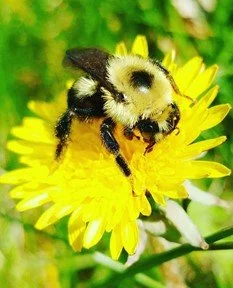World Bee Day - A few years ago a local organization started a community beekeeping program in Peterborough. I have always found bees fascinating creatures and so I decided to join an enthusiastic bunch of other people. What I learned took me down a path of self-discovery, which was both educational and illuminating. It was nothing like the path the Israelites took out of Egypt (Exodus 3:8) but it was still a turning point for me -- and although beekeeping did not flow with milk there was always lots of honey.
It is estimated that in the world today there are between 20,000 – 30,000 species of bees, with approximately 4,000 species native to North America. Up to 75% of our crops rely on bees and other pollinators like butterflies. At the same time all pollinators are seeing a dramatic drop in their populations due to climate change, use of insecticides, loss of habitat, and other factors. And the main culprit of all this damage is humans.
The star of the bee world is the honeybee. We see it everywhere, from packages of seeds to a Cheerios box. Often overlooked but just as important are solitary native bee species like the Leafcutter, Mason or Sweat Bee. The European honeybee was brought by settler colonialists 400 years ago to Turtle Island (North America), for the sole reason that it produced honey and beeswax. This type of bee is not a native species but is considered by biologists to be an invasive species.
Image: Unsplash/Art Rachen
In our human history, honey has been a constant. For example, honey has been found in the pyramids in Egypt. It was coveted for its purity and sometimes became more valuable than gold. It was also used by many cultures through the ages as a medicine, taken internally or used as a salve for burns or other injuries.
In our world now, stories of bees and insects often fill the news; in the past few years we’ve read about killer bees and murder hornets. These are chilling images, but not new ones, as these scary harbingers of fear and death show up elsewhere in the story of the Israelites. (Exodus 23:28 and Deuteronomy 7:20). I would wager that the majority of people would prefer the honeybee over a murder hornet any day. Having worked with honeybees and having had unfortunate run-ins with hornets I would definitely take the former.
We live in a world struggling to come out of a pandemic, seeing the terror of war, facing climate change and addressing so many existential crises coming at us we can easily become overwhelmed and discouraged. The decline of bees and other pollinators has affected the ecological balance of the planet. What can each one of us do to be the change in the world? It starts with educating ourselves (and those around us) and being aware of the world. To look at things with a child’s viewpoint. There is nothing more wonderful then when I work with children at a hive or in the classroom, and when I see the wonder of this blue orb in space (we call Earth) through their eyes.
We – adults and children—can help bees and other pollinators by planting flowers which attract them. We can help bees by buying honey from local beekeepers, not using insecticides, letting dandelions grow in the spring (as they are one of the first sources of nectar) or by learning more about native bee species in our gardens. If we help one species we help all the world. That would be a good lesson for humanity to finally learn. It’s appropriate that the purpose of the UN World Bee Day is “Bee engaged: Build Back Better for Bees”.
United Nations World Bee Day, May 20
By: Tom Childs
Tom is a husband, father and grandfather, was born and raised in Toronto and now lives in Peterborough. He is also an ordained elder and lay missionary in the Presbyterian Church in Canada.
Timeline leading to World Bee Day
20 May 1734 – Breznica, Slovenia Birth of Anton Janša, who came from a long line of beekeepers, became a pioneer of modern apiculture. Bees were a frequent topic of conversation with neighbouring farmers, who would gather at the village and discuss farming and bee-keeping practices.
1766 - Anton enrolled in the first bee-keeping school in Europe.
1769 – Janša worked fulltime as a beekeeper.
1771 – Published the book Discussion on Bee-keeping in German.
2016 – At the FAO Regional Conference for Europe, the Republic of Slovenia proposed World Bee Day to be celebrated on 20 May each year, with the support of Apimondia, the International Federation of Beekeepers’ Association.
2017 – Proposal for World Bee Day was submitted for consideration at the 40th Session of FAO Conference.
2017 – UN General Assembly unanimously proclaimed 20 May as World Bee Day.
20 May 2018 – First Observance of World Bee Day.





